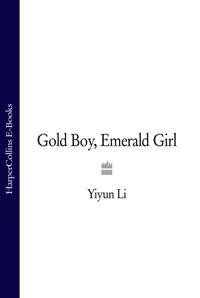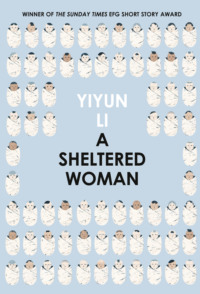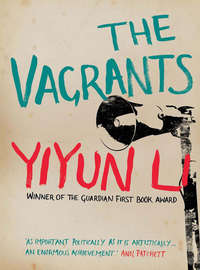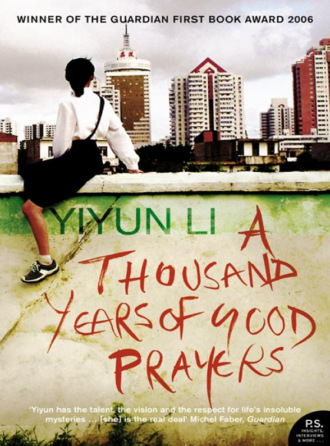
Полная версия
A Thousand Years of Good Prayers

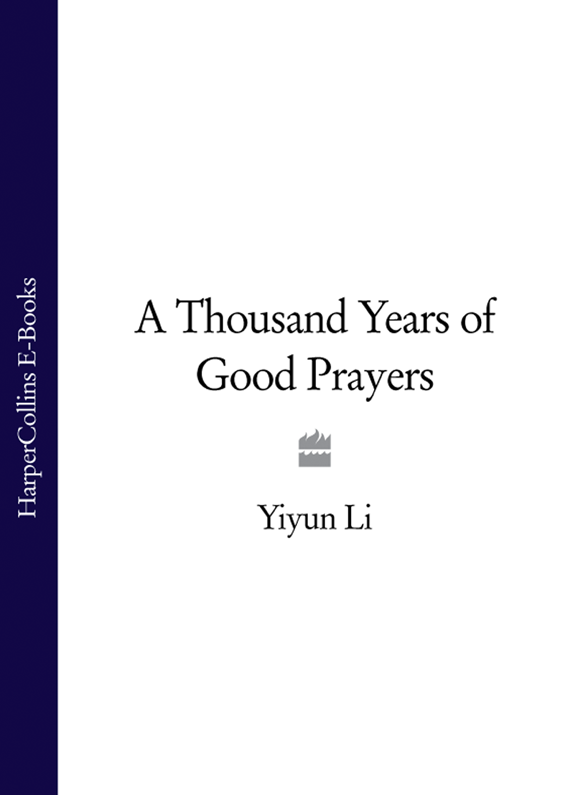
YIYUN LI
A Thousand Years of Good Prayers

Contents
Cover
Title Page
Extra
After a Life
Immortality
The Princess of Nebraska
Love in the Marketplace
Son
The Arrangement
Death Is Not a Bad Joke If Told the Right Way
Persimmons
A Thousand Years of Good Prayers
P.S.
About the Author
About the Book
Acknowledgments
About the Author
Praise
Copyright
About the Publisher
Extra
GRANNY LIN WALKS IN THE STREET ON A NOvember afternoon with a stainless steel lunch pail in her hand. Inside the lunch pail is an official certificate from her working unit. “Hereby we confirm Comrade Lin Mei is honorably retired from Beijing Red Star Garment Factory,” says the certificate in bright golden characters.
It does not say that Red Star Garment Factory has gone bankrupt or that, being honorably retired, Granny Lin will not receive her pension. Of course it will not provide such information, for these facts are simply not true. “Bankrupt” is the wrong word for a state-owned industry. “Internal reorganization” is what has been kindly omitted in the certificate. And, mind this, Granny Lin’s pension is being withheld only temporarily. For how long, the factory has no further information to offer.
“There is always a road when you get into the mountain,” Auntie Wang, Granny Lin’s neighbor, says to her upon being informed of Granny Lin’s situation.
“And there is a Toyota wherever there is a road.” The second line of Toyota’s commercial slips out before Granny realizes it.
“There you go, Granny Lin. I know you are an optimistic person. Stay positive and you will find your Toyota.”
But where on earth can she find a way to replenish her dwindling savings? For a few days Granny Lin adds, subtracts, and divides, and she decides that her savings will run out in a year—in two years if she can skip a meal here and there, go to bed right after sunset, and stay bundled up so that she does not have to feed the insatiable stove extra coal balls through the long winter of northern China.
“Don’t worry,” Auntie Wang says the next time they meet each other at the market, looking down at the single radish Granny Lin has bought for her dinner, as plump as a Buddha, dwelling between her two palms. “You can always find someone and get married.”
“Get married?” Granny Lin says, and blushes.
“Don’t be so conservative, Granny Lin,” Auntie Wang says. “How old are you?”
“Fifty-one.”
“You are even younger than I am! I am fifty-eight, but I am not as old-fashioned as you. You know what? Young people no longer have a monopoly on marriage.”
“Don’t make me a clown,” Granny Lin says.
“I am serious, Granny Lin. There are so many old widowers in the city. I am sure there are rich and sick ones who need someone to take care of them.”
“You mean, I can find a caretaker’s position for old people?” Granny Lin asks.
Auntie Wang sighs and pokes Granny Lin’s forehead with a finger. “Use your brain. Not a caretaker but a wife. That way, you can at least inherit some cash when your husband dies.”
Granny Lin gasps. She has never had a husband in her life, and the prospect of a dead husband frightens her. Yet Auntie Wang makes the decision for her right there and then, between two fish stands, and in a short time she finds Granny Lin a match.
“Seventy-six. High blood pressure and diabetes. Wife just died. Living alone in a three-bedroom flat. Pension two thousand yuan a month. Both sons married and earning good money in the government,” Auntie Wang says, surprised that Granny Lin remains unimpressed. “Come on, Granny Lin, where else can you find such a good husband? The old man will die in no time, and the sons are so rich they won’t mind sparing some of the old man’s savings for you. Let me tell you, this is the most eligible family, as far as I know. Their doorsill has been worn away by the feet of the matchmakers. But of all the possible wives, they are interested only in you. Why? Because you are never married and you have no children. By the way, Granny Lin, how come you aren’t married? You never told us the reason.”
Granny Lin opens and then closes her mouth. “It just happens,” she says.
“You don’t have to tell me if you don’t want to. Anyway, they don’t want someone who has a litter of children and grandchildren. I wouldn’t trust such a stepmother, either. Who can guarantee that she won’t steal from the old man for her children? But you are the best. I have told them that, were there one honest person left on earth, it would be you, Granny Lin. What are you hesitating for?”
“Why don’t they hire someone to take care of him?” Granny Lin asks, thinking of the two sons who might soon become her stepchildren. “Won’t it be cheaper in the long run?”
“Do you not know what those young girls from the nanny market are like? They are lazy, and they steal money—husbands, too, if they are hired by young couples. They leave the old people sitting in their own shit all day long. To hire such a girl? Ugh. It would only push him to death quicker.”
Granny Lin has to agree that, indeed, an older woman as a wife is a wise choice. Accompanied by Auntie Wang, Granny Lin goes to the interview with the two sons and their wives. An hour of questioning later, the two sons exchange a look, and ask if Granny Lin needs some time to consider the marriage offer. Not having much to think about, she moves into her new home in a week. Her husband, Old Tang, is sicker than she has thought. “Alzheimer’s,” a daughter-in-law tells her at their wedding dinner.
Granny Lin nods, not knowing what the disease is but guessing that it has something to do with the brain. She supports her husband with both hands and leads him to the table, sitting him down and wiping away the drool from his chin.
GRANNY LIN BECOMES a wife, a mother, and a grandmother. She no longer remembers in what year of her life people started to call her Granny Lin instead of Auntie Lin; unmarried women, people believe, age faster. It does not matter anymore, because she feels quite qualified for her name.
Every week, one of the sons stops by and checks on Old Tang, leaving enough money for the next week. Old Tang is a quiet man, sitting in his chair by the window, immersed in his bottomless silence. Once in a while, he asks Granny Lin about his wife, and, as instructed by the two sons, Granny Lin replies that the wife is improving in the hospital and will be home in no time. But before she replies Old Tang seems to have forgotten his question, and goes back to his meditation without any sign of having heard Granny Lin. She waits for more questions that never come, and eventually gives up. She turns up the volume of the television and shuffles around the house, sweeping and dusting and wiping and washing, but the time arrives earlier each day when she finishes the housework. Then she sits down on the couch and watches the daytime soap operas. Unlike the twelve-inch television Granny Lin used to own, which required her to make a trip across the room every time she needed to change channels (and all together she got six channels through the antenna made of two steel chopsticks), Old Tang’s set is a monster with scores of channels, which all obey a small remote control. Dazed by all the choices she has, and by the ease of moving from one selection to another, Granny Lin soon finds that the machine does her no good. No matter what program she is watching, there is always the nagging worry that she is missing a more interesting one. Several days into her new life, Granny Lin is stunned to discover that she is no longer addicted to television, as she has been in the past ten years. Does marriage have such revolutionary power that a long-established habit can be overthrown in such a short time?
Granny Lin sighs and clicks off the television. Old Tang does not notice the silence flooding the room. She realizes then that the television is not to blame. It is because of Old Tang’s presence that she cannot focus. She picks up an old magazine and peeks at Old Tang from behind the pages. Ten minutes grows into twenty minutes, and she continues looking at him as he insists on not meeting her gaze. She has an odd suspicion that Old Tang is not ill. He knows she is there, and he is observing her secretly. He knows that his wife of fifty-four years has left him for good and that Granny Lin is his new wife, but he refuses to acknowledge her. He pretends to have lost his mind and expects her to play along as if she were a hired caretaker. But Granny Lin decides not to concede. He is her husband; she is his wife. Their marriage certificate is secure under her pillow. If Old Tang is testing her patience, she is ready to prove it to him; it is a tug-of-war that Granny Lin is determined to win. She puts down the magazine and looks boldly into Old Tang’s face, trying to outstare Old Tang. Minutes stretch into an hour, and all of a sudden Granny Lin awakens in a dread that she, too, is losing her mind. She drags her body out of the couch and stretches, feeling the small cracking of her arthritic joints. She looks down at Old Tang, and he is still a statue. Indeed, he is a sick man, she thinks, and feels the shame of having cast rootless doubt on Old Tang, a man as defenseless as a newborn baby. She walks to the kitchen quickly and comes back with a glass of milk. “Milk time,” she says, patting Old Tang’s cheek until he starts to swallow.
Three times a day, Granny Lin gives Old Tang an insulin shot. Only then does she catch a glimpse of the life left in Old Tang, the small flinch of the muscle when she pushes the needle into his arm. Sometimes a small bead of blood appears after she draws the needle out, and she wipes it away with her fingertip instead of a cotton ball, entranced by the strange sensation that his blood is seeping into her body.
SEVERAL TIMES A day Granny Lin bathes Old Tang: in the morning and before bedtime, and whenever he wets or dirties himself. The private bathroom is what Granny Lin likes best about her marriage. For all her life, she has used public bathrooms, fighting with other slippery bodies for the lukewarm water drizzling from the rusty showers. Now that she has a bathroom all to herself, she never misses any chance to use it.
Old Tang is the only man Granny Lin has seen in full nakedness. The first time she undressed him, she could not help stealing a look now and then at the penis, nestled in a thinning bush. She wondered what it had looked like in its younger years, but right away chased the unclean thought from her mind. The frail nakedness filled her heart with a tenderness she had never experienced, and she has since tended his body with motherly hands.
One evening in late February, Granny Lin leads Old Tang to the plastic chair in the middle of the bathroom. She unbuttons his pajamas and he bends his arms at her guidance, his head leaning on her shoulder blade. She removes the nozzle and sprays warm water on his body, putting one hand on his forehead so that the water does not get into his eyes.
Granny Lin is squatting on the floor and massaging Old Tang’s legs when he touches her shoulder with his palm. She looks up and he is gazing into her eyes. She gives out a cry and backs away from him.
“Who are you?” Old Tang says.
“Old Tang,” Granny Lin says. “Is it you?”
“Who are you? Why are you here?”
“I live here,” Granny Lin says. She sees an unnatural lucidity in Old Tang’s eyes, and feels her heart fall. Such a moment of clarity happens only before a nearing death. Granny Lin had seen the same light two years earlier in her father’s eyes, hours before he passed away. She thinks of rushing out to call a doctor, but her feet are locked on the floor, and her eyes are locked in his eyes.
“I don’t know you. Who are you?”
Granny Lin looks down at herself. She is wearing a bright yellow plastic poncho and a pair of grass green rubber boots, her outfit for the bath time. “I am your wife,” she says.
“You are not my wife. My wife is Sujane. Where is Sujane?”
“Sujane is no longer with us. I’m your new wife.”
“You’re lying,” Old Tang says, and stands up. “Sujane is in the hospital.”
“No,” Granny Lin says. “They lied to you.”
Old Tang does not hear her. He pushes Granny Lin, and his arms are suddenly strong. Granny Lin clutches him, but he is wild with uncontrollable force. She lets go of his hands, not knowing why she needs to fight with her husband over a dead woman. But he is still wrestling with the air and, two steps away, slips down in a puddle of soapy water.
Nobody pays attention to Granny Lin at the funeral. She sits in a corner and listens to the men and women who come up to talk about Old Tang’s life: an accomplished physicist and a great teacher, a loving husband, father, and grandfather. The speakers finish and shake the family members’ hands, ignoring her at the end of the line.
I did not kill him, Granny Lin imagines herself telling every person there. He was dying before the fall. But she does not tell the truth to anyone, and instead admits her negligence. Nobody would believe her anyway, for she alone saw the light in his eyes, the last glimmer before the eternal night, as it is called, the brief moment of lucidity before the end.
GRANNY LIN DOES not get a penny from Old Tang’s savings. She has looked after Old Tang for only two months, and has, in many of the relatives’ minds, killed him with her carelessness. She does not blame the two sons. She can think only of their loss, a thousand times more painful than her own. When one of them suggests a job in a private boarding school that is run by his friend, Granny Lin almost weeps out of gratitude.
Situated in a mountain resort in a western suburb of Beijing, Mei-Mei Academy takes pride in being among the first private schools in the country. It occupies one of the few four-storied buildings that were allowed to be constructed in the area. (“Connections, connections,” the chef tells Granny Lin the day she arrives—how else could the school have gained the permit if not for its powerful trustees?) Private schools, like all private businesses, are sprouting up across the country like bamboo shoots after the first spring rain. Relatives of the Communist Party leaders are being transformed overnight into business owners, their faces appearing on national TV as representatives of the new proletariat entrepreneurs.
Granny Lin cannot imagine a better life now that she becomes a maid at the academy. Every meal is a banquet. Meat and fish are abundant. Vegetables are greener than Granny Lin remembers from her market days. Everything is produced by a small organic farm that serves the president and the premier and their families—so the chef informs Granny Lin.
Sometimes Granny Lin feels sad at seeing so much good food go into the garbage. She begins to come late to her meals, waiting until the students finish theirs. Throughout the dining hall, untouched vegetables are left withering on the plates; shipwrecked fishes lie flat on their half-gnawed bellies. Granny Lin spoons the leftovers onto her plate and dreams of having an express shuttle running between the school and the city every day, taking the unconsumed food to her old neighbors.
Eating such good food without working hard is a sin. In addition to the laundry and dorm cleaning assigned to her, Granny Lin takes on other duties. She gets up early in the morning and opens the classroom windows to let in fresh mountain air. She sweeps and mops the terrazzo floor. She dusts and wipes the students’ desks. She makes sure everything is meticulous, even though the janitor has cleaned the classrooms the night before. Sometimes, when there is still time before the wake-up bell, she leaves the school and takes a walk in the mountains. The morning fog is damp on her skin and her hair, and birds she has never seen in the city sing in a chorus. At such moments, Granny Lin feels overwhelmed by her good fortune. The years in the factory seem a distant dream now, and she no longer remembers what her life was like when she walked through the morning smog expelled by the coal stoves and bargained in the market for vegetables puffed up by chemical fertilizers.
Often Granny Lin gathers an armful of wildflowers on her walk: mountain orchids, pearl cherries, jade barrettes. She arranges the flowers in vases for the six classrooms, one for each grade, but such a delicacy rarely lasts beyond the first period. Boys of all ages pelt one another with the flowers; the boy whose lips touch the flowers is called a sissy. Girls of the upper grades pull the petals off and bury them in a mound in the school yard, their fingers ruthless and their faces shrouded with a sad seriousness.
THE SCHOOL IS growing. Every month a few new students arrive. Granny Lin is stunned by the parents’ wealth, the ease with which they pay the initiation fee of twenty thousand yuan and another twenty thousand for the first year of tuition and room and board.
In the third month of Granny Lin’s stay, the school celebrates its one hundredth student with a feast. Kang, the boy who draws the lucky number, is six years old. Unlike the other students, who come from the city, he was sent from a nearby province. A few days into his stay, the teachers and the staff members have all heard his story. Kang’s grandfather used to be the leader of a big People’s commune in his home province, and his father has become one of the top agricultural entrepreneurs in northern China.
“I thought farmers liked to keep their sons at home,” Granny Lin says to Mrs. Du, a dorm mother, as they search for the foul-smelling socks under the mattresses. “They can almost stand up and walk by themselves” is how Mrs. Du describes the stiff socks that have been worn for too long.
“Not when he is the son of a disfavored wife,” Mrs. Du says. “An extra is what he is.”
“Are the parents divorced?”
“Who knows? But the father does have another wife, or a concubine. What’s the difference? The boy’s mother is no longer needed in the family, and the child has to go, too.”
The thought of the boy, who is so small and occupies almost no space at all in the world yet who is still in other people’s way and has to be got rid of, saddens Granny Lin. She starts to look for the boy among the crowd. His clothes, of the same brand names as those that the other students wear, look wrong on him. Too large, too new, too trendy, the clothes do not belong to him any more than he belongs to the school. His face and hands always seem in need of a thorough wash, but after Granny Lin herself has tended to them several times, she has to agree that it is not the child’s or the dorm mother’s fault.
In the second week, Kang starts to come to the laundry room during the afternoon activity time. “Granny, what’s this?” he asks one day while Granny Lin is massaging some baby lotion into his cheeks.
“Something that will make you a city boy,” Granny Lin says.
“Granny, where do you live?”
“I live here.”
“But before you came here? Where is your husband’s home?”
Granny Lin thinks for a moment. “In the city,” she says.
“What’s the city like? My mom said she’d take me to see the city.”
“Where is your mom?” Granny Lin asks, holding her breath and trying to make her heart beat less loudly. The boy seems not to notice.
“She is at home.”
“Your father’s home?”
“My grandfather’s home. My new mom lives in my father’s home.”
“What’s your new mom like? Is she pretty?”
“Yes.”
“Is she good to you?”
“Yes.”
“Do you like her?”
“Yes.”
“Do you like your mom also? More than your new mom?” Granny Lin asks. She turns around to see whether anyone is walking past the laundry room in the hallway. She feels like a thief.
The boy, too, turns around nervously. He then comes closer and circles his arms around Granny Lin’s neck, his mouth to Granny Lin’s ear, his hot breath touching her earlobe. “Granny, I’ll tell you a secret. Don’t tell anyone.”
“I won’t.”
“My mom said she would come and get me back one day.”
“When?”
“She said soon.”
“When did she say it?”
“Before my new mom moved in.”
“When was that?”
“Last year.”
“Have you seen your mom since then?”
“No, but she said she’d come soon, if I don’t make my dad and my new mom angry,” Kang says. “Granny, do you think the guards will let her in when she comes?”
“I’m sure they will,” Granny Lin says. The boy smells like a mixture of baby lotion, fresh laundry, and clean sweat. It reminds Granny Lin of Old Tang after his bath, the way a dear person smells good. The thought makes Granny Lin’s lips go dry, and she feels the boy’s arms on her neck, hot and sticky.
ON FRIDAY AFTERNOONS, the parking lot outside the school gate is full of luxury cars. Chauffeurs and nannies come, and sometimes the parents themselves show up. Teachers and dorm mothers stand inside the gate, pointing out to one another who is the daughter-in-law of a power figure in the government and who has appeared in the latest hit movie.
Kang is the only child who stays for the weekend. His father has paid the extra fee for the weekend care and has promised to come for him at the end of the semester. Sometimes Granny Lin wonders if the father will ever come and what will become of Kang if no one picks him up when summer comes. Will he be able to stay with her at the school? Then she wonders if she herself will be allowed to stay and, if not, where she will spend the two months before she is allowed back in September.
After the last student is picked up every weekend, the teachers and the dorm mothers leave on a shuttle bus for the city. Apart from the two guards, Granny Lin is the only one who stays, and she has cheerfully agreed to take care of Kang.
They stand side by side at the school gate and wave at the bus. Both sigh with relief once it is gone. Kang darts across the yard to the activity room, flipping through the picture books as fast as he can, eager to get to the next one. Granny Lin comes in and sits down at his side, stroking his hair and watching him laugh to himself. When he finishes all the new books, they go out together and play in the yard, Granny Lin pushing him in the swing until it is flying so high that Kang screams with excitement and fear.
When the weather is nice, they take long walks in the mountains. Weekend tourists swarm into the area, but Granny Lin and Kang are the only two people who do not worry about missing the bus or getting stuck in a traffic jam. They walk hand in hand, Kang’s palm touching Granny Lin’s palm, both sweating. Granny Lin tells old tales about flowers and grasses. When she runs out of stories, she makes up new ones.
After dinner, Granny Lin leads Kang to the bathroom. She waits outside with a towel and his pajamas, and he sings in the shower the song about the red dragonfly she has taught him. Always he shouts to Granny Lin after the first two minutes, asking if he can come out now. She replies it would be good if he could stay in the shower for another five minutes. The boy goes on singing, his voice pure and perfect.
Often, without turning off the water, Kang jumps out of the stall at Granny Lin. She pretends to be startled and screams, and he giggles and runs off before she can wrap the towel around his dripping body.



